Put Gender at the Center
Young Feminist Statement on the Transforming Education Summit
The Transforming Education Summit provides a unique opportunity for government leaders, schools, civil society and young activists to sound the alarm on the education crisis and its gendered implications. We call on governments and state actors to reevaluate their interventions and plans to ensure that they address the devastating impact of budget cuts within the education sector. The future of education is inclusive and transformative, possessing the power to remove systemic oppression that affects the most vulnerable of society; women, girls, indigenous people, gender diverse groups and majority countries. In order for true transformation to be achieved, we believe that it must be gender transformative.
Gender Transformative Education addresses the root causes of gender inequalities, using a whole school approach to design interventions that are meaningful and rooted in feminist principles. To achieve the United Nations Sustainable Development Goals by 2030, requires us to acknowledge that education is pivotal for each goal. Feminist leadership is key to leading us into a future that is resilient and free from inequalities.
Gender Transformative Education also ensures the inclusion of critical curricula like Comprehensive Sexuality Education, which provides a life-changing opportunity for young people to learn about their bodies and how they can safely navigate a world that is rolling back their right to bodily autonomy and reproductive justice. It ensures adequate teacher trainings so that teachers are able to deliver the material in a way that fosters safety of students and the classroom. Gender transformative education focuses on the whole student.
As we approach the Transforming Education Summit in September, we are angry and frustrated that many voices will be excluded due to travel visa inequality. Borders and passport control play huge roles in exclusion and oppression which will hinder vital voices from being a part of global convenings that are created to decide on their futures. We ask for youth activists to be included in government delegations, and not simply as additional government voices.
We call on heads of states to meaningfully partner with young feminist activists and civil society to develop inclusive mechanisms such as reforming education policy that will influence curriculum and teacher training that address the need for comprehensive sexuality education in schools. Vital to this partnership is ensuring the protection of the rights of young feminist and student activists as we continue our work of holding states accountable to the goals of transforming education.
We also call for participatory monitoring frameworks that allow for the inclusion of young people and students in all planning, monitoring and policy making processes within formal educational institutions as a form of proactive accountability. Transforming education is a process and having a holistic approach in all parts of the process: design, implementation, and evaluation, is key.
We ask heads of government and Ministers of Education to:
- Commit to dedicate financing for transforming education that includes partnerships with civil society organisations, young feminist and grassroots organisations.
- Develop a resolution that guides member states to appoint a youth advisory group to their ministries following in the footsteps of Sierra Leone.
- Complete a review of education policy to assess the level of inclusion and gender stereotypes
- Co-create accountability and monitoring and evaluation frameworks with young people to ensure that commitments are monitored
- Commit to collaborating with curriculum coordinators, teachers, parents and school administration to lead consistent workshops and training sessions on gender transformative education
Acknowledging the excellent work done to transform education guided by the five action tracks, emphasis must be placed on placing gender at the center of each action track as it is the only way to ensure that interventions are transformative and sustainable.
The way forward is feminist, inclusive and gender and climate-just. We can no longer afford to put gender on the back burner. The effects of the education crisis are gendered. We must address the gender inequalities in education in order for us to achieve gender equality in 2030 and beyond.

